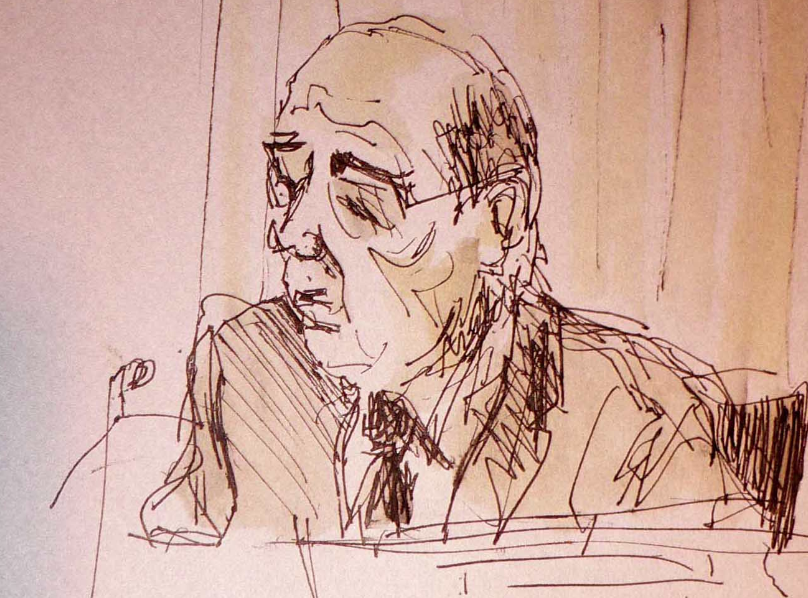Children caught up in the criminal justice process – whether as victims, witnesses or defendants – will have less protection from being named in the media than some adults, following a controversial High Court decision this week.
- Shauneen Lambe is a barrister and director of Just for Kids Law. The charity was given permission to intervene and was represented in the case by Ian Wise QC and Maria Roche of Doughty Street Chamber, both acting pro bono. www.justforkidslaw.org
- The sketch is of Lord Justice Leveson by Isobel Williams. See Isobel’s blog HERE
Children involved in crown court trials are frequently protected from being publicly identified by the Children & Young Persons Act 1933, section 39. It was believed that, for obvious reasons, anonymity continued even after that child reached adulthood, provided the criminal proceedings were over before they reached 18. However, this had never been formally tested – until now.
In a concerning decision, the High Court ruled that there is no power under the act to protect anonymity past a child’s 18th birthday – even if the court case ended many years earlier.
It is a decision which could have a serious impact on anyone who historically came forward as a child victim, witness or defendant. Once they reach 18, there will nothing to stop the press from naming them – even if it risks reviving a traumatic and difficult episode in their lives.
Similarly, former child defendants will be able to be named at age 18, with all the damage that could do to their rehabilitation and reintegration prospects. With the internet, a mistake made as a young child could end up following them forever, and mean they are never able to put the offence properly behind them.
The judges, led by Lord Justice Leveson, specifically recognised the need to protect child victims and witnesses, but concluded their hands were tied by the wording of the act. Lord Justice Leveson said the court could not ‘create a solution out of legislation that was simply not designed to have regard to what is now understood of their need.’ He called on Parliament to ‘fashion a solution…as a matter of urgency.’
As a result of this decision, children will now have less protection than vulnerable adults – certain adult witnesses and victims are protected by a later statute (the Youth Justice & Criminal Justice Act 1999) which specifically states they have anonymity for life.
Commenting on this discrepancy, Lord Justice Leveson said: ‘It is truly remarkable that parliament was prepared to make provision for lifetime protection available to adult witnesses….but not to extend that protection to those under 18, once they had reached the age of majority, even if the same qualifying conditions were satisfied.’
The case of JC & RT concerned two former child defendants who were given community sentences for offences committed when they were 16 and 17. In 2013, both had pleaded guilty to possessing explosive substances. They went to the High Court to challenge an earlier crown court ruling that, having turned 18, they could now be named even though the criminal proceedings against them were over by that stage.
The BBC and other news groups joined the action as interested parties, arguing in favour of being able to name the teenagers and, because of the seriousness of the issue, Just for Kids Law was given permission to make representations as to why anonymity should be preserved into adulthood.
Lord Justice Leveson said that the BBC’s barrister had no answer to the ‘lacuna in law’, whereby child witnesses will have less protection than adults, other than to suggest that victims and witnesses could apply for an injunction to stop the media from naming them at 18 – a solution he said was ‘entirely unrealistic’.
The difficulties of encouraging child victims and witnesses to come forward are well recognised, as the BBC might know better than most, following the NSPCC report into the Jimmy Savile scandal. The fear of being exposed in the media in the future might be likely to deter victims from speaking up.
According to the BBC’s own child protection policy, children’s interests are at the heart of everything they do, but, following this case, children who have been victims of crime might disagree.
This ruling also flies in the face of internationally recognised principles about the need for special treatment for children. The UN Committee of the Rights of the Child says that if the defendant was a child when an offence was committed, the traditional objectives of criminal justice must give way to rehabilitation and re-integration, rather than retribution. Publishing the names of those who were children during court proceedings allows the press to usurp the decision of the criminal courts and impose an additional punishment.
The lawyers acting for JC & RT are hoping to appeal this decision; and organisations like ours will also be campaigning with others for a change in the law to ensure that children’s anonymity can be properly protected.







